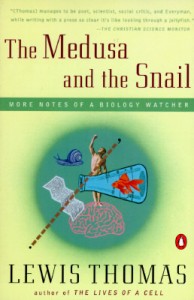 Step back, once again, to read the questions posed by a thoughtful physician. Dr. Thomas presents us with some 29 brief, challenging, curious, skeptical, and often humorous essays on the human condition. They inevitably raise more questions than answers:
Step back, once again, to read the questions posed by a thoughtful physician. Dr. Thomas presents us with some 29 brief, challenging, curious, skeptical, and often humorous essays on the human condition. They inevitably raise more questions than answers:
- Why do we feel euphoria when watching small animals going about their work? (I ask this after sitting on our deck, wondering why our squirrels and chipmunks are forever so industrious.)
- Do ants as a group “think?’ (Edward O. Wilson may answer than one)
- Where do we fit in this “inter-collaborative system” called earth?
- Why are mistakes the essential elements of life?
- Should we play Bach before all committee meetings?
- Why do we meddle so much?
- Why are commas useful?
Those questions along should encourage a re-reading of the good Dr. Thomas, who died in 1993 after serving many years as head of Memorial Sloan-Kettering Cancer Center in New York.
Some further jewels:
- “All the forms of life are connected.” The earth is a “system of interacting, intercommunicating components that, as a group, act or operate individually and jointly to achieve a common goal through the concerted activity of the individual parts.”
- “We are components in a dense, fantastically complicated system of life; we are enmeshed in the inter-living, and we really don’t know what we’re up to.”
- “We are … worrying animal. We worry away our lives, fearing the future, discontent with the present, unable to take in the idea of dying, unable to sit still.”(Doesn’t this describe our responses to world events in 2015?)
- “Man has always been a specifically anxious creature with an almost untapped capacity for worry; it is a gift that distinguishes him from other forms of life.”
- On human surprise: “ … we have a whole eternity of astonishment stretching out ahead of us.” “It seems to me the safest and most prudent of bets [is] to lay money on surprise.”
If these brief quotes intrigue you, read this book, plus some of his other works: The Lives of a Cell: Notes of a Biology Watcher (1974) and Late Night Thoughts on Listening to Mahler’s Ninth Symphony (1983).
Editor’s Note: ‘The Medusa and the Snail’ by Lewis Thomas is published by Viking, New York 1979.
 About the Author: Felix Kloman is a sailor, rower, husband, father, grandfather, retired management consultant and, above all, a curious reader and writer. He’s explored how we as human beings and organizations respond to ever-present uncertainty in two books, ‘Mumpsimus Revisited’ (2005) and ‘The Fantods of Risk’ (2008). A 20-year resident of Lyme, he now writes book reviews, mostly of non-fiction that explores our minds, our behavior, our politics and our history. But he does throw in a novel here and there. For more than 50 years, he’s put together the 17 syllables that comprise haiku, the traditional Japanese poetry, and now serves as the self-appointed “poet laureate” of Ashlawn Farms Coffee, where he may be seen on Friday mornings. His wife, Ann, is also a writer, but of mystery novels, all of which begin in a bubbling village in midcoast Maine, strangely reminiscent of the town she and her husband visit every summer.
About the Author: Felix Kloman is a sailor, rower, husband, father, grandfather, retired management consultant and, above all, a curious reader and writer. He’s explored how we as human beings and organizations respond to ever-present uncertainty in two books, ‘Mumpsimus Revisited’ (2005) and ‘The Fantods of Risk’ (2008). A 20-year resident of Lyme, he now writes book reviews, mostly of non-fiction that explores our minds, our behavior, our politics and our history. But he does throw in a novel here and there. For more than 50 years, he’s put together the 17 syllables that comprise haiku, the traditional Japanese poetry, and now serves as the self-appointed “poet laureate” of Ashlawn Farms Coffee, where he may be seen on Friday mornings. His wife, Ann, is also a writer, but of mystery novels, all of which begin in a bubbling village in midcoast Maine, strangely reminiscent of the town she and her husband visit every summer.